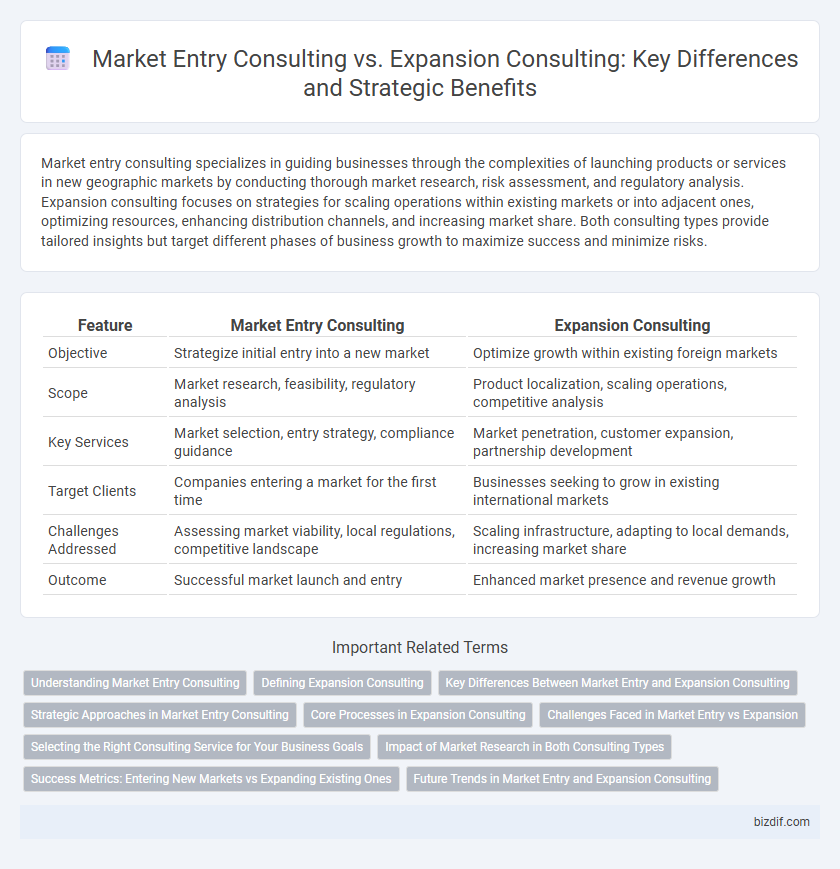Market entry consulting specializes in guiding businesses through the complexities of launching products or services in new geographic markets by conducting thorough market research, risk assessment, and regulatory analysis. Expansion consulting focuses on strategies for scaling operations within existing markets or into adjacent ones, optimizing resources, enhancing distribution channels, and increasing market share. Both consulting types provide tailored insights but target different phases of business growth to maximize success and minimize risks.
Table of Comparison
| Feature | Market Entry Consulting | Expansion Consulting |
|---|---|---|
| Objective | Strategize initial entry into a new market | Optimize growth within existing foreign markets |
| Scope | Market research, feasibility, regulatory analysis | Product localization, scaling operations, competitive analysis |
| Key Services | Market selection, entry strategy, compliance guidance | Market penetration, customer expansion, partnership development |
| Target Clients | Companies entering a market for the first time | Businesses seeking to grow in existing international markets |
| Challenges Addressed | Assessing market viability, local regulations, competitive landscape | Scaling infrastructure, adapting to local demands, increasing market share |
| Outcome | Successful market launch and entry | Enhanced market presence and revenue growth |
Understanding Market Entry Consulting
Market Entry Consulting focuses on analyzing new geographic or sectoral markets to identify opportunities, regulatory requirements, and competitive landscapes, enabling businesses to develop informed entry strategies. This consulting service prioritizes market research, risk assessment, and strategic planning to ensure successful introduction and positioning of products or services. Understanding consumer behavior and local business practices are critical components, distinguishing market entry from expansion consulting, which typically targets growth within already established markets.
Defining Expansion Consulting
Expansion consulting focuses on helping established businesses grow within existing or new markets by optimizing operational scalability, enhancing market penetration strategies, and identifying opportunities for product or service diversification. It involves detailed analysis of competitive landscapes, customer behavior, and regulatory frameworks to support sustainable growth and maximize return on investment. Unlike market entry consulting, which concentrates on initial access to unfamiliar markets, expansion consulting addresses strategic scaling and deeper market integration challenges.
Key Differences Between Market Entry and Expansion Consulting
Market Entry Consulting primarily focuses on analyzing new geographic or demographic markets, assessing regulatory requirements, and developing strategies to launch products or services successfully in unfamiliar territories. In contrast, Expansion Consulting targets existing markets where a business already operates, emphasizing scaling operations, optimizing supply chains, and increasing market share through customer segmentation and competitive analysis. Key differences lie in the scope of research and strategic emphasis: market entry prioritizes risk assessment and local market adaptation, while expansion consulting centers on growth optimization and resource allocation within established markets.
Strategic Approaches in Market Entry Consulting
Market Entry Consulting emphasizes comprehensive market research, competitor analysis, and regulatory compliance to develop tailored strategies for successful initial market penetration. This strategic approach focuses on identifying target customer segments, positioning products effectively, and optimizing distribution channels to mitigate entry risks. Core elements include feasibility studies, local partnerships assessment, and cost-benefit analysis to ensure a sustainable and competitive market launch.
Core Processes in Expansion Consulting
Expansion Consulting focuses on core processes such as market analysis, operational scaling, regulatory compliance, and local partnership development to ensure sustainable growth in new regions. This consulting service optimizes supply chain management, staffing strategies, and customer acquisition tailored to the target market's cultural and economic environment. By addressing these critical areas, Expansion Consulting minimizes risks and accelerates the successful establishment of a business footprint beyond initial market entry.
Challenges Faced in Market Entry vs Expansion
Market Entry Consulting faces challenges such as assessing regulatory compliance, understanding local consumer behavior, and establishing distribution networks from scratch. Expansion Consulting focuses on scaling operations, managing increased competition, and integrating new offerings into existing market presence. Navigating legal frameworks and adapting marketing strategies are critical obstacles in both contexts but differ in complexity and scope.
Selecting the Right Consulting Service for Your Business Goals
Market Entry Consulting specializes in analyzing target markets, regulatory environments, and competitive landscapes to develop effective strategies for launching new products or services. Expansion Consulting focuses on scaling existing operations, optimizing supply chains, and identifying growth opportunities within established markets. Choosing the right consulting service depends on your business goals: prioritize Market Entry for initial market launch and Expansion Consulting for increasing market share and operational efficiency.
Impact of Market Research in Both Consulting Types
Market research drives informed decision-making in both market entry consulting and expansion consulting by identifying customer needs, competitive landscapes, and regulatory environments. In market entry consulting, rigorous market research minimizes risks by validating market potential and strategic fit before launch. For expansion consulting, ongoing market research uncovers growth opportunities and adaptation strategies to sustain competitive advantage in evolving markets.
Success Metrics: Entering New Markets vs Expanding Existing Ones
Market entry consulting success metrics prioritize assessing market potential, regulatory compliance, and initial customer acquisition rates, ensuring a strong foundation in unfamiliar territories. Expansion consulting focuses on metrics such as revenue growth, market penetration, and operational scalability within established markets. Both approaches require tailored strategies to optimize resource allocation and achieve sustainable growth milestones.
Future Trends in Market Entry and Expansion Consulting
Market entry consulting increasingly leverages data analytics and AI-powered market research to identify lucrative opportunities and mitigate risks in emerging sectors such as renewable energy and digital health. Expansion consulting prioritizes scalability strategies and local partnership models, facilitating seamless adaptation to regulatory changes and consumer preferences in diverse geographies. Future trends emphasize a hybrid approach combining technology-driven insights with agile methodologies to ensure sustainable growth and competitive advantage.
Market Entry Consulting vs Expansion Consulting Infographic

 bizdif.com
bizdif.com